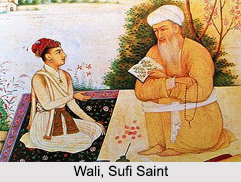 Walis or Sufi Saints are the chief upholders and inspiration behind the establishment and spread of the practice of Sufism. The great Sufi saints are termed Wali, i.e., those who have established a connection with the universal consciousness. Their Wilayat, the effect of spirituality, can either be Wilayat Awwal or Wilayat Doyam. The saints possessing Wilayat Awwal are close to God i.e. their attention is focused entirely upon God. They may be blessed with strange and divine attributes e.g. the capability to fly in the air, simultaneous presence at a number of places etc., and they have the capability of transmitting power (Shaktipat). The saints possessing Wilayat Doyam are close both to God as well as the world i.e. their attention is focused on both. They have a connection with and control over the world, i.e. they are the worldly people who have realised the Truth. This means that they are ordained to serve the people and to benefit them from their presence. It is not that the saints with Wilayat Awwal are not at all concerned with the world but their main focus remains on the God. They may or may not pay any attention to the world at all.
Walis or Sufi Saints are the chief upholders and inspiration behind the establishment and spread of the practice of Sufism. The great Sufi saints are termed Wali, i.e., those who have established a connection with the universal consciousness. Their Wilayat, the effect of spirituality, can either be Wilayat Awwal or Wilayat Doyam. The saints possessing Wilayat Awwal are close to God i.e. their attention is focused entirely upon God. They may be blessed with strange and divine attributes e.g. the capability to fly in the air, simultaneous presence at a number of places etc., and they have the capability of transmitting power (Shaktipat). The saints possessing Wilayat Doyam are close both to God as well as the world i.e. their attention is focused on both. They have a connection with and control over the world, i.e. they are the worldly people who have realised the Truth. This means that they are ordained to serve the people and to benefit them from their presence. It is not that the saints with Wilayat Awwal are not at all concerned with the world but their main focus remains on the God. They may or may not pay any attention to the world at all.
People connected with saints are able to benefit spiritually from them on account of the effect of Wilayat Awwal. It may, however, happen that a saint may have the effect of both Wilayat Awwal and Wilayat Doyam in him or only one of them or the effect of one may be more than the other. The Tavajjoh of saints benefits people only due to the effect of Wilayat Awwal. When the great Sufi saints depart from this world, they take away with them their Wilayat Doyam but bestow Wilayat Awwal to one or more of their disciples. If they have a son, who is connected with their Sufi way, he inherits Wilayat Awwal. Generally Wilayat Awwal once bestowed is not taken away unless the disciple commits a serious wrong.
Sufi Saints belong to three categories. These are Abid, Sufia and Malamita. Abid saints are those who are concerned only with the outer form of the religion i.e. they engage themselves in worship, fasting, prayer, charity and paying visit to holy places etc. They are not concerned with the internal practices like Jikr or meditation and generally do not feel any bliss in these activities. They have not yet entered into the world of love and unity.
Sufias are those who get an entry into the world of love and unity. They do not hide their spiritual state from the world. They remain tuned to God and consider the world to be His Reflection. They engage themselves in various internal practices such as Jikr, meditation, and contemplation and experience the bliss. They are also known as saints, Wali, Hans and Paramhans etc. Some of them may adopt particular attires and may exhibit the miraculous powers acquired by them. They, therefore, distinguish themselves from others. A fine veil of ego thus remains present in them.
Malamita are those saints, Wali, Hans and Paramhans (Sufis), who do not reveal their spiritual state and live like ordinary worldly people. They live like ordinary persons and attend to normal worldly affairs like anyone else and may engage themselves in worship, fasting, prayer and charity but at the same time keep themselves engaged in internal practices and remembrance of the God. Although they possess spiritual powers they do not exhibit them. No difference, however, exists in their feelings and behaviour i.e. they have no duplicity. They do what they say. For them although the Almighty is Omnipresent, He does not show His Presence. Similarly they do not consider it appropriate to exhibit to the world their spiritual accomplishments. They do not behave in any manner that can be said to be violating the norms or etiquettes.
Some Malamita Sufis at times, however, deliberately say or do something that is apparently not in accordance with the dictates of the religion, although on a thoughtful consideration it may not be so. They do this to shun people away from them. They do this because they still have a concern for the world, which still exists for them. They are considered as having duplicity in their behaviour. There status, therefore, is considered to be lower than that of Malamita Sufis, who do not distinguish themselves from others in any manner and thus have no veil of ego left over them.
Thus discussed above are the Walis or Saints of Sufism.






































